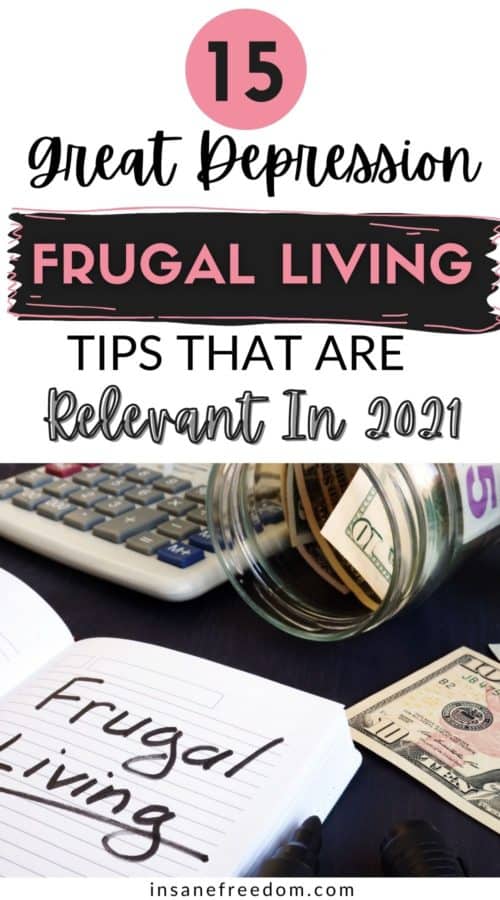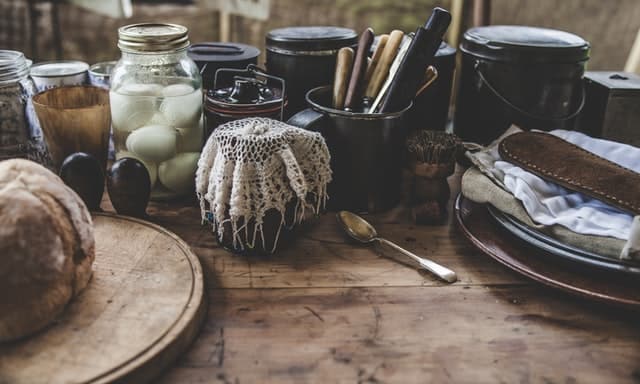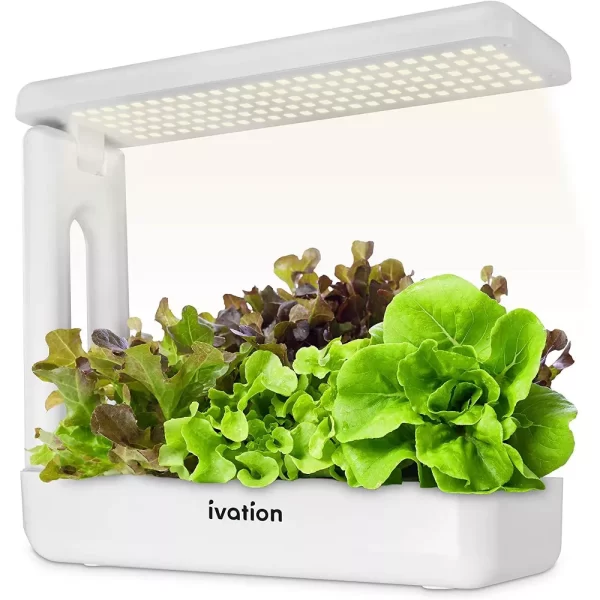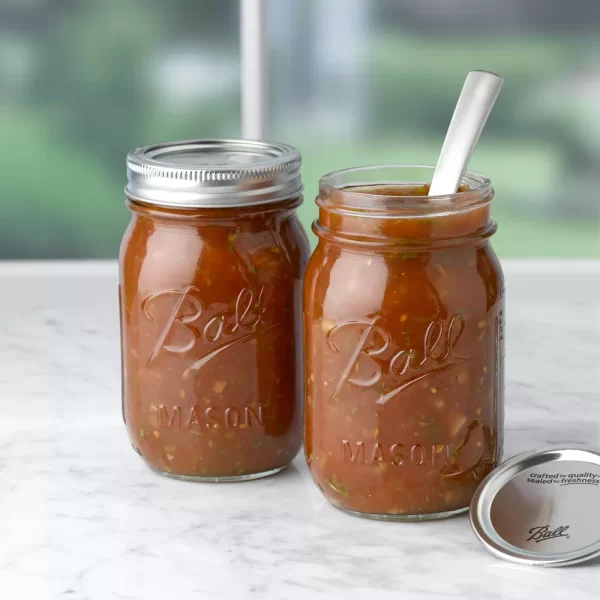Back then, our grandparents and great-grandparents knew how to make the most out of their resources and do more with less. Today, their knowledge and experience can prove hugely invaluable to those of us who are looking to spend as little as possible and save our hard-earned money.
As we are living through uncertain times during this unprecedented pandemic, any tips and hacks to make our money work harder for us and stretch further is certainly appreciated.
With that in mind, here are 15 ways that those who lived through The Great Depression-era can teach us about how to live frugally.
15 Frugal Living Tips From The Great Depression That Are Relevant To 2022
Contents

1. Grow Your Own Food

Those living through The Great Depression saved money on food by growing what they could, and this remains a great way to keep your costs down if you’re striving to live on $1,000 a month or less.
If you have the garden space for it, there’s no reason why you can’t grow a whole assortment of root vegetables, herbs, and fruit. Otherwise, it’s still possible to grow things like herbs, potatoes, tomatoes, and strawberries if you live in an apartment.
The best way to start is with an indoor garden kit such as this Complete Hydroponic Grow System for Herbs, Plants and Vegetables. It is a self-contained system complete with LED light, 15 planting baskets, 5 planting hats and seeding tray! The best part of this kit is the AC power adapter and power cable that makes it perfect for growing your own vegetables in apartments and areas with no sun light.
2. Use Homemade Cleaning Products
Our great-grandparents managed to keep a clean home without spending $5 – $10 a time on household cleaning products. Instead, they simply used everyday items and you can too.
Mixing white vinegar and hot water, for example, proves just as effective at cleaning counters, floors, and sinks as any off-the-shelf cleaner.
If you have a lemon to hand, adding a dash of lemon to that mix can make it even more powerful.
3. Use Things Conservatively
Do you really need *all* that dishwashing liquid for just a few dishes?
Can you get away with using less shampoo when it comes time to wash your hair? A great way to stretch your household cleaning and personal hygiene products is by adding water to use them for longer. Not only is doing so better for the environment, this frugal living tip from The Great Depression also saves you a good amount of money in the long run.
You may be surprised to find that little goes a long way and that if you stick to just what you need, everyday items will last much longer.
You can even buy these cheap beauty spatulas which are designed to help you scrape out every last drop from your beauty products, but which work just as well for other hygiene products and even cleaning supplies.
4. Get into Meal Planning

Living through The Great Depression meant people didn’t have the luxury of ordering take-out or having a whole pantry full of different things which allowed them to eat whatever they were in the mood for.
They had to carefully plan out their meals so that they could keep their costs down and, today, meal planning is a great way to help you stick to a budget and manage your money better.
You can look for recipes that share similar ingredients to help you save money and even batch cook so that you’ve always got a freezer full of delicious, nutritious meals ready to go.
This can be especially helpful if you find yourself short on time to cook during the week. knowing that you can just reach into the freezer and warm something up can help resist the urge to spend money on ordering in.
Don’t have the time nor the energy to create your own meal plans? Grab the $5 meal plan here for delicious, healthy and cheap weekly recipes! You can save hundreds of dollars(and time)each month through these done-for-you meal plans.
5. Waste Nothing
Sticking to the topic of food, those who got through the Great Depression did so by ensuring that absolutely nothing was wasted.
A chicken, for example, was not just used for its meat. Bones were used for broth, feathers were repurposed for bedding, even the gizzards were consumed.
While the idea of devouring chicken gizzards may be gross to some, the idea of using as much as possible of any given item can still be very helpful when it comes to living frugally in the modern age.
6. Recycle and Upcycle
On a similar theme, non-food items can still be repurposed and enjoy a second life long after they’ve worn out their original purpose. Our great-grandparents took old clothes that could no longer be worn and recycled them into clothes and rags for cleaning. That’s still a great idea even today.
If your furniture is looking a little worse for wear, follow one of the best money-saving tips from the Great Depression era by upcycling it instead of replacing it.
7. Learn How to Sew

The Great Depression saw a boom in people learning how to sew, and for good reason:
It was far easier -and more affordable- to pick up a cheap sewing kit and mend clothes that are ripped, torn, or damaged, than it was to throw them away and replace them. The same is still true in 2021 and beyond.
You can pick up a beginner’s sewing kit and follow basic sewing tutorials on Youtube to help you learn how to do everything from reattaching a button to a shirt to fixing your ripped jeans and more.
8. Do It Yourself
Of course, sewing isn’t the only skill it’s useful to learn if you want to save some money.
Learning basic DIY skills can save you a small fortune when it comes to taking care of house and home, picking up a few simple auto repair techniques, or even learning how to make your pizza so that you don’t have to call Dominos can all help you to keep more money in your pocket.
There may still be times when you need to call in the experts, but if The Great Depression taught us anything, it’s that we’re a resourceful species who are more than capable of fixing and repairing plenty of the items we use in our life.
9. Avoid Using Credit
Credit cards simply weren’t an option during The Great Depression.
Sure, they’re an option now. However, if one of your financial goals is to get or stay out of debt, then it makes sense to do as our antecedents did and stick to cash-only.
10. Minimize Your Utility Usage
It’s the 2020s, so nobody is saying you should be sitting in the dark with only a candle and a cold bath of recycled water for company, but that doesn’t mean you can’t be more mindful about your utility consumption.
Those who lived through The Great Depression knew that things like water, heat and electricity came with a price attached, and so they were used only sparingly.
Even now, this remains a great way to keep our day-to-day living expenses down.
11. Get Canning
Canning has enjoyed a resurgence in popularity in recent years, but during the Great Depression it was practically a necessity to extend the shelf life of certain food items.
As useful for those interested in frugal living as it is for home cooking aficionados, canning is a simple but enjoyable hobby that has the bonus of ensuring your pantry is always full.
All you have to do to start is research how to perserve and pickle food, and getting yourself good quality mason jars.
12. Keep Your Own Scraps Jars
If you’ve finished canning and find you have a few leftover jars, you might want to consider keeping your own scrap jars. These jars were a staple of just about every Depression-Era kitchen and ensured that absolutely nothing in the home was wasted.
Egg shells and other food scraps can be added to a scrap jar and later used to create compost for growing your own vegetables. Scraps of fabric can be kept for repairing clothes, pillow cases and blankets, and fruit peels can be kept for improving the effectiveness of your DIY cleaning products.
13. Leave the Car at Home
Another top money-saving tip from The Great Depression is to simply leave the car at home and bike, walk, or take public transport.
Of course, this may not be practical if you live miles away from work with no public transport links, but otherwise, it’s a great way to not only save money, but to protect the environment.
Plus, it will more than likely do your physical health the world of good too!
14. Rethink Home Entertainment

We like to think that even if Netflix, Hulu and Spotify had been around during our antecedents’ day, they probably wouldn’t have used them all at the height of the depression.
Back then, they had to think of cheap –even free– ways to entertain themselves, and there’s plenty of ways you can do the same.
Cutting back on subscription services, dropping channels from your cable bill and using free streaming services, free TV, or even the library for your home entertainment can all help keep your costs down.
15. Buy Items That Are Built to Last
Last but not least, here’s something which may not at first seem like it counts as a frugal living tip: Buy higher quality items to begin with.
Yes, they may cost more in the short-term, but in the long-run, you’ll likely save a small fortune on repairs and replacements.

What The Great Depression Taught Us About Frugal Living
Whether it’s being more mindful about meal prep or simply using up every last scrap, those who lived through The Great Depression had a lot of inventive and ingenious ways to save money that can be incredibly useful to those of us looking to live frugally in the modern age.
More than any other tip, trick, or technique though, the biggest lesson we can learn from our grand-parents, great-grandparents, and great-great-grandparents is to live within our means.
We don’t have to deprive ourselves of anything, we don’t have to live the way people lived 100 years ago, but simply by being more mindful about our spending habits and only buying what we can afford can go a long way to improving our financial well-being.
For more ideas and inspiration, see our guide to the 7 money management lessons the pandemic taught us.




